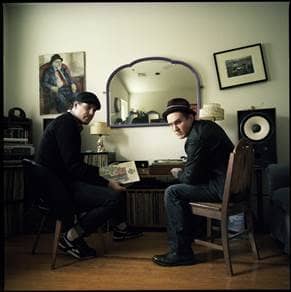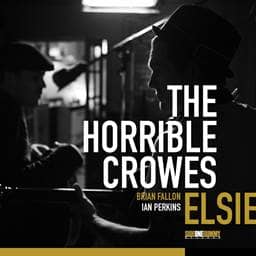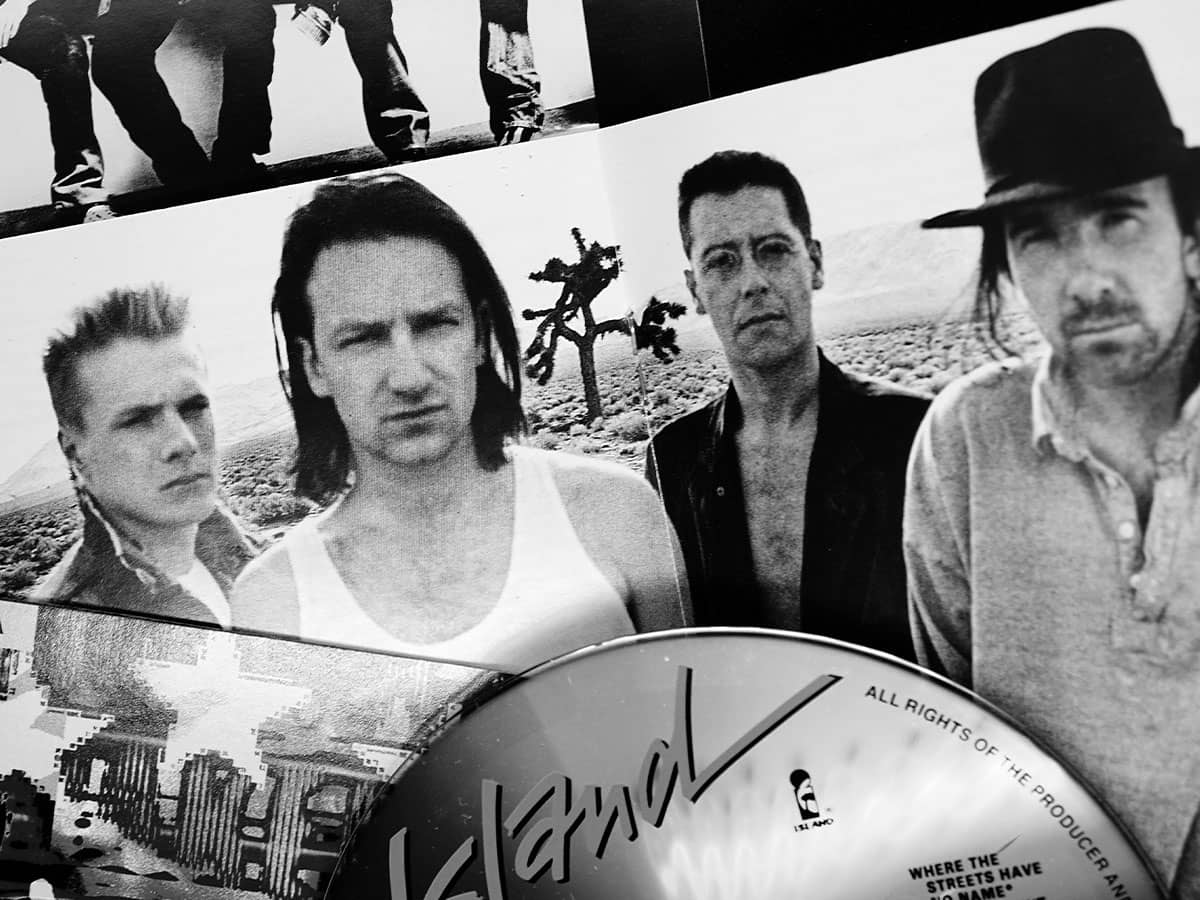
Ian Perkins and Brian Fallon, The Horrible Crowes
Photo credit Danny Clinch
31 year-old Brian Fallon isn’t the first person who comes to mind when you think “Christian musician.” The fast talking New Jerseyan has been catapulted into the spotlight with the success of his classic-rock inspired indie band The Gaslight Anthem. He started out in the music business in 1997, but didn’t find success until the Gaslight Anthem formed in 2007. The band has been most compared to Bruce Springsteen, but remnants of ‘80s punk and even grunge fill their sound. What you will notice about his music though, is that the lyrics shine with a kind of positivity and depth that isn’t found in much modern rock music. You definitely won’t hear any profanity, a rarity in the genre he is a part of.
For Brian, the reason for that is simple, he is an absolutely devout Christian. His faith permeates all parts of his life, and though he made the decision to play secular music he is committed to his beliefs. He recently released a compelling side-project with his touring guitarist Ian Perkins, called The Horrible Crowes. Together they have produced an album that pulls jointly from the darkness of soul music and the depth of his spiritual insight. The whole project is an engaging listen, taking you through the turns of a broken relationship while bringing to light Fallon’s abilities as a lyricist and a vocalist. The contrast of dark and light is evident throughout, and it is that rare album that tells a story and tells it well.
I was fortunate to catch up with Brian following his appearance on Chuck Ragan’s Revival tour in Europe. We discussed Christianity, the Horrible Crowes, the tour, and more. Interviewing Brian was much like listening to his music – at first take it is a brash and overwhelming experience. But after delving in, there is so much more to hear, from deep spiritual movements to joyous reminders. He is truly a fascinating person to talk to, and I hope you enjoy the interview as much as I did!
Click here to pick up The Horrible Crowes’ album Elsie
So tell me a little about the tour, it sounded interesting.
Sure, it was a tour that was called the Revival tour, a tour that Chuck Ragan started. He brings a bunch of guys from different bands and they all play acoustic. So, the guys all come out and you learn each other’s songs and you play each other’s songs, and some of the guys have sets by themselves and together. So it’s kind of this big family band kind of thing, and it’s pretty interesting, there’s nothing I’ve ever seen that’s like it before. So it’s kind of cool, it’s a real throwback to the folk festivals of the ‘60s and the traveling families when America was being settled and how people would share songs with each other and things like that. It was a folk revival of things that were past and not done anymore.
When I was a kid it was just me and my mom, and my mom took me to a very small church in New Jersey, in I think it’s Belmont, which is kind of a dumpy town. It was a small wooden church with maybe thirty people. They would play all the really, really old hymns. You would go in there and there wasn’t anything contemporary or modern about it. There were no drums, just a big ole organ and that’s it. Actually it wasn’t a big organ, it was just a ratty old tiny organ. You know, it almost looked like an AA [Alcoholics Anonymous] center, you know what I mean? Like something that someone had rented out rather than something someone had established. It was pretty, and that’s kind of where I grew up, and that’s the first memory I have from being raised in a church. Then all throughout my life that was what we did on Sunday, we just went to church. You know when you do your 15 or 16 year old soul searching, all the infinite wisdom that you have at 16 and 15, you question things and you wonder. I just ended up believing it, but I couldn’t just take my parent’s word, I had to figure it out for myself. But rather than go and shoot a bunch of drugs or anything like that, I was like this is something that I actually want to know about, whether it is or it’s not true. I found it to be true, and I’ve followed it the rest of my life.
How do you go about practicing that now with the extremely busy schedule that the band has?
I think it’s about making time. That’s something that to me is more important than everything that I have to do. My band is my job, and it just happens to be that my job got to be my passion, but it’s like if you’re with your family and have a child, that’s your most important priority. It’s all about your priorities, and I can’t say I always do this, but my priority is definitely with my faith and God. I don’t think that all of this other stuff would have happened had it not been for God, because honestly I don’t understand what makes my songs better than anyone else’s and I don’t know why people like them, and I don’t even know why they come to me. It’s that whole verse “seek ye first the kingdom of God and His righteousness and all these things be added unto you,” I just really took that to heart and that’s what I believe. So when I go about my day on tour, the guys leave me alone, they don’t bother me about it. I’ve got my Bible and usually I start out the day like that, cup of coffee and read a little Scripture and then go to sound check or an interview or whatever. The other guys, in the beginning when we first started they looked at me like “what are you doing?” you know, “what are you doing with that?” and I’m like “nothing just reading my Bible” and they’re like “alright” (laughing) and now they just think it’s funny. Not in like a making fun of way, they are like “oh there’s old preacher Fallon in the corner” you know?
So what led you to making secular music?
That was a big fight, actually, within myself when I was 18 because I felt like I should. I was raised in the church so automatically I’m supposed to be in a Christian band or a praise band and I kept thinking “well these are the songs I should be writing but how come I can’t write those kinds of songs?” I would talk to people because I just felt like those were the rules and that’s what you were supposed to do, until I realized that that’s a calling. As if you were a pastor or a missionary or whatever, there are callings in life and I think that to write religious music and Christian music, to write what’s considered Christian music I think that’s a special kind of calling. I don’t think you can just say “hey I believe in Jesus I’m gonna go write Christian songs.” It just doesn’t work like that. I think that for me it was more about, I just gotta go do my thing and I’m going to write about what I know about and I’m not going to use any cuss words and if anybody asks me what I believe then I’m going to tell them. And that’s it. It’s kinda worked out pretty good.
Have you found that your audience responds to that?
Yeah, I think so, I think that it’s something that people notice. Parents bring their kids to our shows because they know I’m not going to drop a bunch of curse words during the show. But there are kids who are Christians and they come up to me at the end of the shows and be like “are you a Christian?” and I’m like “you know, I’m not talking about a Spanish guy when I thank Jesus in the record” (laughs), “you know, it’s real to me” and they talk to me. You know the other kids, I don’t really push it on anybody so they don’t care. They don’t mind because I’m not shoving something down their throat that they don’t want to hear.
How does it influence your writing? There isn’t anything overt on The Horrible Crowes record, but there are a lot of religious undertones, do you think there was more on this record because it wasn’t Gaslight?
Yeah, you know with Gaslight I’m not trying to put my agenda across because the other guys don’t share the same beliefs I do. If you’re gonna start talking about things that are of a certain faith you need to have all of the people involved in that being of a certain faith, and if I felt called to do something like that I would have to leave my situation. A house divided can’t stand.
On this album there is an interesting mix of the religious elements and really dark imagery. Where did that come from for you?
Well, that kind of started at my teenage years, what I wrote about was what I saw. I wasn’t trying to make it overtly dark but I think that those years for kids are tough, they’re not really bright years. I grew up my whole life in the church and I never heard somebody talk about “hey man, you know, what do you do when you want to hang yourself?” so I was like, well I’m going to deal with that. What do you do when you know you’re not supposed to do drugs but you feel like it because you can’t stand the sight of waking up another day, what are you going to do? And that happens sometimes and sometimes it’s for silly things like you break with a girl or whatever, kids are picking on you at school. But in your mind when you’re young like that all these tiny problems are blown into astronomical proportions because your emotions are new to you and you have no experience in life of how to deal with this stuff so I think it’s something that hits you very hard. So when I wrote this record I wanted to let people know that “hey man other people feel like that too and feeling like that isn’t wrong. You gotta sort through it.”
What would you say the overall message of this project is?
Well, the Horrible Crowes kind of came from a broken relationship. It started out with the song “Last Rites” where a guy gets left by one situation and feels like there’s nothing else for him, talking about getting his last rites sung to him, which, is a little bit melodramatic in the real world (laughs). It ends with a song called “I Believe Jesus Brought Us Together” which is pretty amazing because for such a dark record it kind of turns out pretty positive. Funny enough, that song was written in Japan the night of that huge earthquake, which we were all in. So, that’s a little strange thing, but that’s kind of the beauty of that, you don’t know what’s gonna come out when, it just comes out.
For you, what are the biggest musical differences between it and The Gaslight Anthem?
With The Horrible Crowes record, that started basically from the drums up. That was a big difference between Gaslight where it’s usually an acoustic guitar structuring out the song. With The Horrible Crowes guitars almost didn’t have anything to do with the writing. We would just start with these drum loops, and then we would start working on pianos and organs, then sometimes hand claps and whatever inspired us to make something. We would build the songs up like that from the ground up. It was in reverse.
Why did you decide to do it differently?
Just for an experiment. The routine was kind of becoming “make a record go on tour make a record go on tour” and it was just kind of like, “alright, what else is out there?” I have this desire to be creative still, even though Gaslight had just written a record, and I didn’t know where to place that energy. You know, it’s like an itch that you can’t scratch. If you want to write then you have to. I was just trying to think what would be good, and then Ian and I were talking about all of this completely different music and we said hey let’s try and wrote some songs. Even if it never comes out let’s see what happens.
I loved your vocal delivery throughout the album, did you feel less inhibited on this record than on previous records?
Yeah definitely, but that kind of came from the tour for Gaslight Anthem’s American Slang. I started to try and learn new things with my voice and it really started to go well. I think that with the Horrible Crowes it was just the first record that I got to experiment with my voice and seeing exactly what it’s capable of and now I can’t wait to see what’s going to happen on the next Gaslight record.
How do you think that doing this record will influence that next Gaslight album?
Well, I definitely know how to write songs from a completely different standpoint, I feel like I have more tools in the toolbox.
What’s the plan for you guys?
Actually we are going to start practicing next week, we’ve got some songs and we’re planning on recording around January, sometime during the winter, and maybe the record will come out in the early summer. We’re like “just keep moving, just get it while the faucets running.” ‘Cause I don’t know when it’s going to turn off (laughs). I don’t know when I’m going to wake up and say “Oh well I can’t write any songs, that’s it, band’s over! See you later, I’m going to be a preacher, bye!” (laughs)
Do you really think that that’s what would happen?
Ah, I have no idea that’s just always the joke around the band, me and the drummer constantly joke about that, that if I wasn’t a musician I would be a preacher. But I’d be like one of those guys who carried a wagon around in the Midwest with like, a black suit, and my wife and kids with dust everywhere (laughs) and I’d be yelling about the end of the world or something. I don’t know why I’m fascinated by that stuff but I am!
I think you should come out on stage like that for the next tour!
Maybe I might, you never know what’s going to happen.


